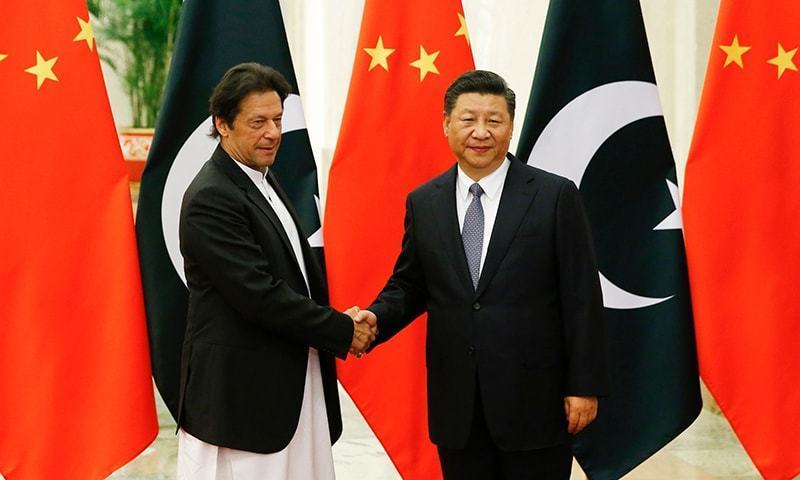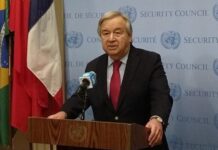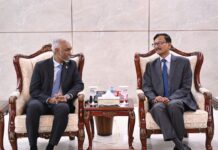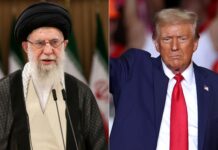BEIJING: China and Pakistan firmed up their cooperation under the USD 60 billion CPEC by signing a host of agreements on Sunday, including upgradation of a Karachi-Peshawar railway line, launching of second phase of the Free Trade Agreement and establishment of a dry port.
The agreements were stated to be part of the next phase of the China-Pakistan Economic Corridor (CPEC).
Pakistan Prime Minister Imran Khan who came here to attend China’s second Belt and Road Forum (BRF) on April 25 met Chinese Premier Li Keqiang on Sunday during which they signed an agreement to build a double railway track from Karachi and Peshawar, Pakistan’s state-run Radio Pakistan reported.
The railway agreement is titled “Declaration for Completion of Preliminary Design of Phase-I for Upgradation of ML-1”.
The BRF was held here from April 26-27 to highlight China’s trillion-dollar Belt and Road Initiative (BRI) in which the CPEC, connecting China’s Xinjiang with Pakistan’s Gwadar port and covering about 3,000 kilometres, is a flagship project.
India protested to China over the CPEC as it is being laid through Pakistan-occupied Kashmir (PoK).
As per the previous reports, to build the Karachi-Peshwar railway line covering a distance of over 1,680 kilometres, China would provide USD 8.4 billion funding for it as part of the CPEC projects.
Soon after he came to power in August last year, prime minister Khan’s government expressed concern over the huge amount and Railway Minister Sheikh Rashid said it would be slashed by USD two billion to reduce the debt burden.
During Khan’s first visit here in November, China agreed to extend the CPEC projects towards western regions of Pakistan, following criticism that most of the projects were garnered by the dominant Punjab province.
China said about USD 19 billion have been spent so far under the CPEC projects mainly relating to energy and power generation.
Recently, Chinese Foreign Ministry while dispelling concerns over debt burden of the CPEC projects said only less than 20 per cent were based on loans provided by China and rest of the 80 per cent ventures are either directly invested by Beijing or use Chinese grants.
Pakistan is going through an acute balance of payments crisis and Khan on Saturday met IMF Chief Christine Legarde to discuss the bailout package.
The cash-strapped country has already received several billions of dollars in funding from Saudi Arabia, the UAE and China to meet the present economic crisis.
No monetary details of the agreement to build the railway line were disclosed. Rashid is part of Khan’s delegation visiting China.
Rashid was quoted in a Pakistan magazine that it would be an 1,800-kilometer-long double track with fencing and bridges and a game-changing initiative for Pakistan’s economy.
Rashid said Main Line-1 (ML-I) from Peshawar to Karachi via Lahore would be upgraded under the CPEC which includes upgradation of the entire railway line and would be completed in next five years.
A report in Pakistan daily Dawn quoted Rashid as saying that the speed of trains on the new track will be around 160 kmph.
China and Pakistan also singed an agreement to launch the second phase of the Free Trade Agreement (FTA) under which China will open up 90 per cent of its market for Pakistani goods in an effort to address trade deficit which stood at USD 9.7 billion last year.
While China exported goods worth USD 11.45 billion, Pakistan’s exports to China were valued at USD 1.744 billion last year.
It is estimated that the new FTA would increase Pakistani exports by USD 500 million. The agreement is being concluded after protracted negotiations spanning over nearly seven years, said the media reports in Pakistan.
The two sides also signed an agreement to establish a dry port at Havelian city in Khyber Pakhtunkhwa province. It is located in the Karakoram highway connecting China and Pakistan.
The other agreements signed on Sunday included an MoU on cooperation in the field of marine sciences between the China Geological Survey (CGS), Ministry of Natural Resources of China, the Institute of Oceanography, Ministry of Science and Technology.
Also an MoU between China International Development Cooperation Agency (CIDCA) and Ministry of Planning, Development and Reform on implementation of the projects under the joint working group of the CPEC on socioeconomic development.
China-Pakistan Economic and Technical Cooperation Agreement for Rashakai special economic zone joint venture.
Later in the day while addressing the Pak-China Trade Investment Forum, Khan said the BRI had “become much more than the Chinese leadership had imagined”.
About his talks with President Xi Jingping he said, “I am happy we talked about getting help from China in science and technology. We want to establish an elite university for eight subjects where china has excelled”. PTI







